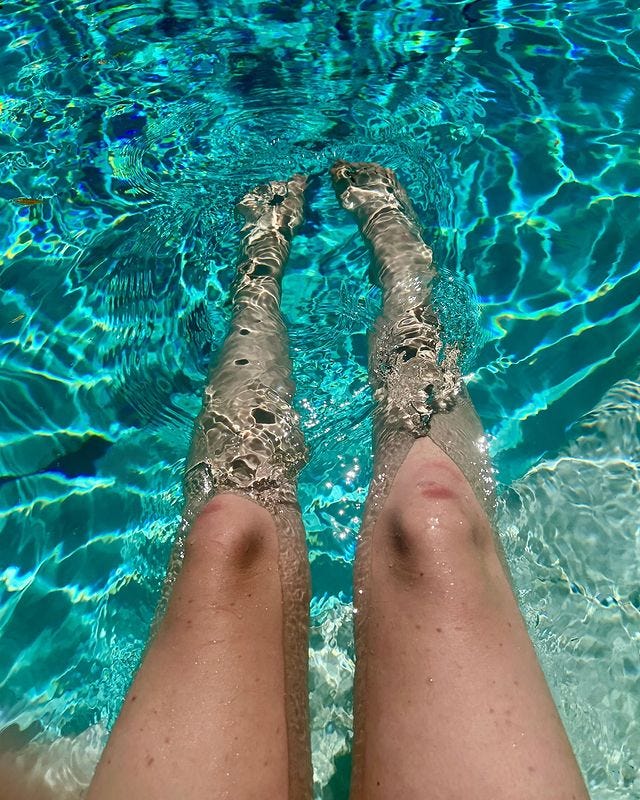Happy Saturday!
Here’s what I have for you today:
Housekeeping
What I bought
What I want
What I’m listening to
What I’m reading
Quotations
Tweets
& a disclaimer, again: Things are mostly terrible right now, and the violence is appalling, and there are many people out there who have addressed and do address it better than I ever could, so I’m not getting on a soapbox here—this will just be your weekly round-up featuring what I’ve been reading and thinking through, like usual.
Things to read:
Housekeeping:
After reading this Catherine Breillat interview last week, I went to go see Last Summer today. The people who get it get it. Highly recommend. (And I’m dying to revisit the script, so if someone can find it online, please email me the link.)
I also started to put some things on my wall and went swimming. Glorious week.
What I bought:
A pair of perfect vintage Levi’s
Birkenstocks, finally
Suction cups to add to my phone case (for selfie reasons)
What I want:
This bag (aspirational)
What I’m listening to:
This, on repeat.
What I’m reading:
Quotations:
Did I choose the time or did the time choose me? I was raised in a conservative Christian home during the postwar 1950s–’60s. Yet I knew as a young girl that I had special feelings for particular girlfriends and older women, but like 99.9% of girls my age, I assumed I’d marry a man because there was no visible alternative. The boys I dated were friends more than objects of desire and that continued through college even though I had several intense, nonsexual relationships with women. In 1980, I married a man I’d been living with but five years later, fell into the arms of an out lesbian. Finally! A different outcome! No more marriage, but for the first time I felt like a whole person and it was exhilarating.
And what motivates my mark-making? Feelings, desires, wanting to bring something that matters to me into visible form. And yes, my desires are pretty fluid and I openly embrace the different erotic subjectivities that inhabit my brain, from Hothead Paisan to gay cowboys and androgynous comic book heroes. Humor is always important — not taking myself too seriously and letting the playfulness come through. About the sex toys: they are so widely used yet fraught with such heavy social and psychic baggage in Puritan America. Doesn’t everybody have a vibrator? Why does the world act as though we don’t? Some sex toys are works of art in themselves with the prices to match. Why not celebrate objects that can add so much zest and pleasure to life? One of the best things about being older is that you give less of a shit about what other people might think. You just barrel on through with your truth and let the chips fall where they may.
If you say that you believe people should be free to bang their wrists, gain weight, use methamphetamine, date whom they like, or live in “risky” seeming circumstances, you’ll be accused of encouraging flagrant self-destruction and welcoming the downfall of society. The fear of unfettered bodily freedom is so great that people continue to cling to it despite mountains of evidence showing that harm reductionist approaches work far better than expecting every person to make “healthy choices.”
Harm reduction isn’t giving up on a person. It’s giving up on our fantasy of who people should be, and our illusion of controlling their fate. Harm reduction allows us to accept human beings as they truly are so that we might love them more fully. It’s humbling, and it often means sitting with grief.
Suicidal intention is at its root a longing for escape — and you don’t ease that longing by giving a person more to escape from.
The lover was here and then was not. This is always the case. The lover persists in loverness and then, poof. Not poof poof but out of the kitchen and casual nakedness. The lover is a long tail though. Whipping around. Not understanding the sublime beauty of respite. I used to fuck almost any body out of starvation hunger that splits the one into many and leaves you arching toward a stinky mattress on a floor. It could be. I could have been. Times when the world dissolved into waves. Who knows that kind of blurry nothingness. Nothing is due. The more my father died the more mattresses. Floors and car interiors. Dirt. Dark air. Hallways. Un-destinations. Railway car junkie smelling of Eau Sauvage Dior.
The desert burned even the spit in my mouth.
Every bird the same shade of ochre.
-José Felipe Ozuna, “Border-Crossing on a Rothko Painting”
When Beauvoir claimed that van Gogh could never have been born a woman, she meant that such a woman, having scarcely begun to posit herself as a free and authentic being, could never have taken the human condition onto her tender shoulders. When Woolf wrote that no woman in Shakespeare’s time could have possessed Shakespeare’s genius, she meant that a woman of the same raw talent and background would have lacked the money, education, and legal right to stride onto the stage of the Globe. Between these two arguments there lies an almost infinite gulf. The female van Gogh is the victim of an existential foreclosure, one that can be overcome only by a transcendent act of will that Beauvoir left perilously nebulous. By contrast, Shakespeare’s sister, as Woolf called her, is simply the victim of a shut door. It is no great mystery what keeps her on this side of it: Someone has gone and locked it.






